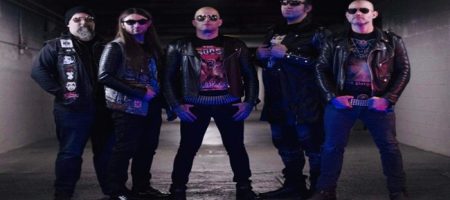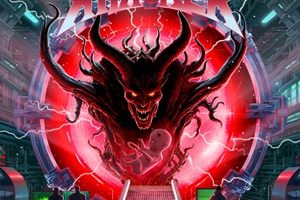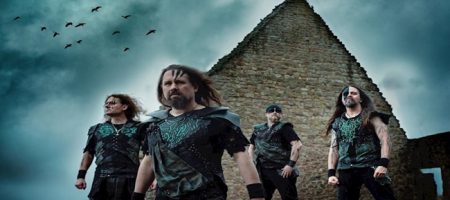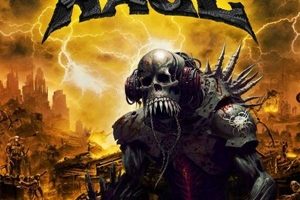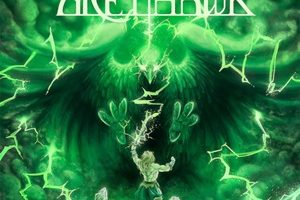Axenstar – Victorious Symphony
Thursday, 14th December 2023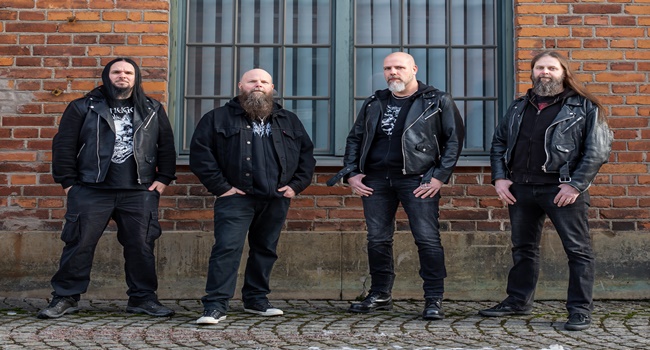
Fortunate to access promos from this Swedish power metal outfit since the start through their debut album from 2001 Perpetual Twilight, Axenstar arrives strong as ever for their eighth studio platter for Chapter VIII. The quartet lives for a European melodic power metal style that helped launch the careers of Helloween, Sonata Arctica, Rhapsody, and Stratovarius among others – as listeners enjoy uplifting melodies, speedy riffs, and catchy hooks abound in a variety of tempos. Reaching out once again to bassist/vocalist Magnus Winterwild, he brought us up to speed on the new record, latest video work, cover art and its relevance in the current metal marketplace, thoughts on the state of power metal, band chemistry and its importance, concerns about war and global starvation, plus what’s in store for the group going into next year.
Dead Rhetoric: Chapter VIII is the latest Axenstar album, coming out four years after End of All Hope. How do you feel the songwriting and recording sessions went for this set of material – and did the prolonged down time due to the global pandemic allow you and the band to really dig deeper into the finer details of this record?
Magnus Winterwild: Well, after the last album there’s always a bit of a gap I guess where we don’t write or record anything. We know that since we have started, we’ve taken a couple of years between releases, but we start as soon as possible. Then the pandemic struck, but we continued to see each other in rehearsals, and we started writing. A couple of months after the release of the last album, we lost our drummer again. We figured let’s just write some songs, solve the drummer problem later on. The pandemic had an impact on the progress. As you said, it maybe gave us some more time, at least for me, to concentrate on the lyrics and the vocal melodies, to try out different melodies. I think maybe in the end it was a positive thing for us, that we got the extra time.
Dead Rhetoric: Where do you think this record sits compared to the previous catalog of Axenstar material?
Winterwild: I guess I always try to look back on the old albums and write some songs that connect to the old fans. And I feel I’ve accomplished that as well on this album. It’s a mix of all the aspects of all the different songs that we write over thirty years. It’s a nice follow-up to End of All Hope, as well as some progress, I guess. It’s something for the old fans as well as for the new fans.
Dead Rhetoric: You have a new drummer again with Pelle Åkerlind, best known for his work on the last Morgana Lefay album. What circumstances took place for Hampus Fasth’s departure, and what do you enjoy most about Pelle’s abilities that keep things strong musician-wise for the band?
Winterwild: Hampus left because he was going to start studying again, and he was going to sell his car, because he was going to lose his income. He decided just to leave the band, there were no hard feelings. It was sad in a way, because he is a good drummer and a great guy. Then we needed a drummer for the new album, it was kind of a friend of a friend who knew Pelle. And we asked him if he was interested in recording the drums, like a session drummer at first. We’ll see if he will become a full member of the band, or what the future brings. He’s also a great guy, easy going, and a very skilled drummer. We are happy to have him.
Dead Rhetoric: Were you always a fan of Morgana Lefay in the past?
Winterwild: Yes, for sure.
Dead Rhetoric: Can you tell us about the performance music video you shot with Anders Ekman for “Heavenly Symphony”? Did this seem like an obvious single choice – and what are you thoughts on the visual medium promoting the brand of the band through social media platforms and how that differs from the impact of music videos during the Headbangers Ball / major media channel days of the 80’s, 90’s and early 2000’s?
Winterwild: Anders is a friend of the band as well. He works in a theater here in Uppsala, Sweden. We had contact with him and wanted to do a new music video, he told us to come down to the theater, they have these great lights for a show they were doing. We did it during the day, set up all the lights, it became a really cool video, I guess.
You need to have a video these days as well. I loved Headbanger’s Ball, saw it every week. It would air Sunday nights, twelve o’clock at night, so I would record it on a VCR. Back in the days I guess, music videos have always been important. Especially now, if you just link to a Spotify stream, I would rather prefer to watch a video than just listen to a song.
Dead Rhetoric: The band has shifted back with Inner Wound Recordings. Do you believe that they have the proper staff and knowledge to push Axenstar given the work they’ve done in the past with many melodic, power, and progressive metal acts, and how do you feel being a part of their roster?
Winterwild: We had released Where Dreams Are Forgotten through Inner Wound in 2014. But then, for some reason we didn’t continue to work together. We feel really great to be back with Emil and Inner Wound because he’s always been really great helping us, sending us statements for the record sales and so forth. That has not always been the case with other labels (laughs). We feel confident that he will do the best for the band.
Dead Rhetoric: How did the cover art process work with Brazilian artist Rafael Tavares for Chapter VIII? Where do you see the importance of cover art in making the proper impression for people to know what to expect from a band – is it still valid and important especially in the metal genre?
Winterwild: Rafael contacted us actually and offered his services. We got in touch, we decided to work together, and we gave him some info on how we visualized the cover. It took some time, but we feel the end result is really great. Absolutely this cover is in the old, power metal style. Like many other people, I don’t buy as many records anymore – I usually listen to music on Spotify. But if you go to a record store and look at the covers, I think the cover should really mirror what the sound is like. I think it’s important, but not as important as it has been in the past. You had to go down and check out the actual albums in the record store before streaming took place.
Dead Rhetoric: What is the biggest challenge at this point when it comes to your songwriting- coming up with strong melodies and lyrics, or more of the music so you don’t repeat yourselves?
Winterwild: I guess for me it’s always been lyrics that are the hardest thing. We usually start with the guitars, coming up with riffs, and then put it together in the rehearsal room. The melodies, I will always come up with some okay melodies, but the lyrics often I struggle with the most. For sure, we will repeat ourselves in some ways, as long as it’s not that obvious. It’s better to repeat yourselves than copying some other bands, I guess.
Dead Rhetoric: What do you think first attracted you to the power metal genre? How do you feel about the state of the power metal scene today, what excites you – and what changes (if any) would you like to make for the greater good of the movement?
Winterwild: What attracted to me in the first place was the speed and the melodies, the happy songs. I have always been a fan of Helloween, the high-pitched vocals. There is always circles, everything comes back again. Maybe we are on the upper side of the circle and power metal is a bit more popular again. Changes – I don’t know if any will help. Also, I don’t usually listen to new music, I listen to a lot of the old stuff, the familiar stuff. Go back to the roots, how did they do it – and get the inspiration there.
Dead Rhetoric: How would you describe your abilities as a singer, songwriter, and musician that can play multiple instruments in terms of your evolution from when you first started Axenstar to where you are at currently? Which aspects come naturally for you versus others?
Winterwild: I started out maybe as a guitarist/singer in the beginning. When we changed the name to Axenstar, I did the lead vocals and keyboards. Not that it was my highest wish to do this, but somebody needed to play the keyboards, so I took on the challenge. Through the years I was the guitarist for a couple of years, and I changed to bass because a lot of guys like to play the guitar, not so many like to play the bass. It’s easier to find a new guitarist.
The singing is the easiest. I’ve always been singing. (laughs).
Dead Rhetoric: How has your relationship with your fellow bandmates evolved over the years? Do you believe that there’s a mutual understanding and respect for not just what you do musically, but also the friendships and interests developed on a personal level?
Winterwild: I think being in a band is a social thing as well. When you start out, you go to a rehearsal room and you create something together, it’s a great feeling. If you don’t work out on a personal level, the chemistry is off, and the band won’t last – or at least it won’t be that fun. Many times over the years, we’ve come to the rehearsal room and maybe not played one song – just sit down and talk and discuss other things. We are all great friends – not that we hang out that much on a personal level. You can always call each other and talk about anything. It’s a second family, I guess.
Dead Rhetoric: What do you think are some of the challenges the average fan struggles to understand about the decisions a band like Axenstar has to make at your level?
Winterwild: A lot of people don’t realize how much time and money you put into the band. You need to want to get it back, being paid at a gig, selling stuff, you can’t give away free stuff all the time, it won’t make any sense. A lot of fans want us to play in their town, do tours – all of us have families, bills to pay, if you take time off work, you need to pay to do a support tour for a bigger band. It’s a big economic challenge to be in a band if you want to do something.
Dead Rhetoric: Three of the members of Axenstar made appearances on a Tearfuleyes album Lacrimosis Oculis released last year. How did these guest spots come about – and did you enjoy stepping outside of your normal comfort zone to do this?
Winterwild: Yes, a friend of a friend, again. They asked us if we would do it. I gladly do guest appearances if I can, and I feel I do an okay job. It’s always nice to not need to write lyrics or come up with the melodies – just to do the best performance I can.
Dead Rhetoric: How do you view the state of the world currently? If you had unlimited finances, energy, time, and resources to make some changes, what areas do you think needed to be looked at and take action on for the greater good of the majority of people in our society?
Winterwild: Big question! (laughs). The situation today, it’s really horrible. All the wars, starvation, natural disasters. It’s not good at all. If I had unlimited money, I don’t know what I would do. Try to stop world starvation, first of all. War is really horrible, but to starve to death, it’s nothing you would wish even on your worst enemy. Maybe just take away all the guns, I guess!
Dead Rhetoric: What would be some of the best memories over the career of Axenstar?
Winterwild: Every time that you do a show in some other country, you meet the people. When they’ve been listening to you for years, that’s always the greatest feeling. When they have old band shirts on, that’s when you realize you can make an impact in people’s lives. We get emails telling us about listening to a special song that got them through at a difficult time in their lives, so that’s great.
Dead Rhetoric: What’s on the agenda to support the album for the next year or so as far as touring, festival appearances, promotions, etc.?
Winterwild: That’s another issue, I guess. We’ve never been a touring band; we always do a couple of shows when we release an album. It will be the same this time around. We will do a release show in January or February, play a couple of gigs in Sweden. Hopefully some festivals in the summer. Nothing has been decided yet. I know a lot of people want us to do tours, but it’s just not up to us to decide. We will do our best.












